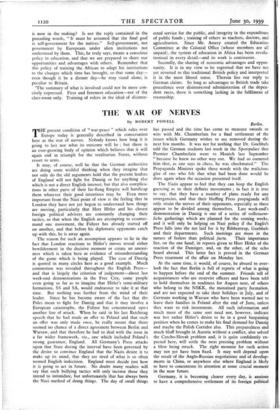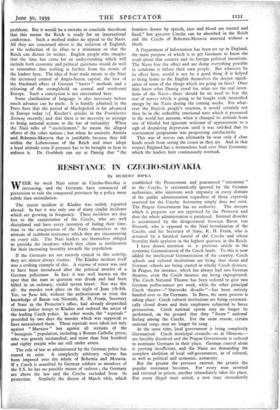THE WAR OF NERVES
By ROBERT POWELL
THE present condition of " war-peace " which rules over Europe today is generally described in conversation here as the war of nerves. Nobody knows how long it is going to last nor what its outcome will be ; but there is an ever-growing body of opinion which believes that it will again end in triumph for the totalitarian States, without resort to arms.
It may, of course, well be that the German authorities are doing some wishful thinking when they imagine that not only do the old arguments hold that the present leaders of England will not fight for Danzig or for anything else which is not a direct English interest, but that also complica- tions in other parts of their far-flung Empire will handicap them whatever their good intentions may be. Even more important from the Nazi point of view is the feeling that in London they have not yet begun to understand how things are moving, particularly that Herr Hitler and his closest foreign political advisers are constantly changing their tactics, so that when the English are attempting to counter- mand one movement, the Fiihrer has already started off on another, and that before his diplomatic opponents catch up with this, he is away again.
The reason for such an assumption appears to lie in the fact that London reactions to Hitler's moves reveal either bewilderment in the decisive moment or create an uneasi- ness which is taken here as evidence of misunderstanding of the game which is being played. The case of Danzig is quoted in many circles here as a good example. Much commotion was revealed throughout the English Press— and that is largely the criterion of judgement—about last week-end demonstrations in the Free City, some people even going so far as to imagine that Hitler's semi-military formations, SS and SA, would endeavour to take it at that time. But nothing was further from the mind of their leader. Since he has become aware of the fact that the Poles mean to fight for Danzig and that it may involve a European catastrophe, the Fiihrer has concentrated upon another line of attack. When he said in his last Reichstag speech that he had made an offer to Poland and that such an offer was only made once, he really meant that there seemed no chance of a direct agreement between Berlin and Warsaw, and that therefore he had to deal with the issue in a far wider framework, viz., one which included Poland's strong guarantor, England. All Germany's Press attacks upon that State during the interval have been governed by the desire to convince England that the Nazis desire it to make up its mind, that they are tired of what is so often termed English indecision. England must decide just how it is going to act in future. No doubt many readers will say that such bullying tactics will only incense those they intend to intimidate, but unfortunately that has always been the Nazi method of doing things. The day of small things Berlin. has passed and the time has come to measure swords or wits with Mr. Chamberlain for a final settlement of the issues which Germany wishes to see removed during the next few months. It was not for nothing that Dr. Goebbels told the German students last week in the Sportpalast that Premier Chamberlain went to Munich last September " because he knew no other way out. We had so cornered him that, as one says in chess, he was checkmated." The Propaganda Minister spoke these words with the malicious glee of one who felt that what had been done would be done again when the occasion presented itself.
The Nazis appear to feel that they can keep the English guessing as to their definite movements ; in fact it is true to say, that they have a number of plans ready for any emergencies, and that their bluffing Press propaganda will only strain the nerves of their opponents, especially as these appear to be divided among themselves. Last week-end's demonstration in Danzig is one of a series of volkstuem- liche gatherings which are planned for the corning weeks, and it will only be helping on Nazi policy if the English Press falls into the net laid for it by Ribbentrop, Goebbels and their departments. Such meetings are more in the nature of feelers than political .facta. Their importance lies, on the one hand, in reports given to Herr Hitler of the reaction of the Danziger, and, on the other, of the echo heard abroad. This latter fact is proved in the German Press treatment of the affair on Monday last.
At the same time, it would, of course, be absurd to over- look the fact that Berlin is full of reports of what is going to happen before the end of the summer. Friends tell of acquaintances who are reservist officers and have been told to hold themselves in readiness for August next, of others who belong to the NSKK, the motorised party formation, and are not expected to take their holidays in July, and of Germans working in Warsaw who have been warned not to leave their families in Poland after the end of June, unless they want to risk internment. All such information and much more of the same sort need not, however, indicate war but rather Hitler's desire to be in a good bargaining position when he comes to make his final demand for Danzig and maybe the Polish Corridor also. This preparedness and much bluff brought in Austria without a conflict, also solved the Czecho-Slovak problem and, it is quite confidently ex- pected here, will settle the next pressing problem without a blow being struck. The right moment for such action may not yet have been fixed. It may well depend upon the result of the Anglo-Russian negotiations and of develop- ments in China, or anywhere else where England is likely to have to concentrate its attention at some crucial moment in the near future.
Germany, it is becoming clearer every day, is anxious to have a comprehensive settlement of its foreign political problems. But it would be a mistake to conclude therefrom that this means the Reich is ready for an international conference. Such a method makes no appeal to the Nazis. All they are concerned about is the isolation of England, or the reduction of its allies to a minimum so that the Reich can dictate its wishes. English people who imagine that the time has come for an understanding which will include both economic and political questions would do well to remember that nothing is further from the minds of the leaders here. The idea of freer trade means to the Nazi the increased control of Anglo-Saxon capital, the loss of the blackmail effect of German " barter " methods and a releasing of the stranglehold on central and south-east Europe. Such a conception is not entertained here.
Some clarification of language is also necessary before much advance can be made. It is frankly admitted in the Press here that the period of Machtpolitik is far advanced in Europe today (cf. Kircher's articles in the Frankfurter Zeitung recently) and that there is no necessity to attempt to bring national actions to the bar of rationality. When the Nazi talks of " encirclement," he means the alleged efforts of the other nations ; but when he encircles Austria and. Bohemia-Moravia that is justifiable because they fall within the Lebensraum of the Reich and must adopt a loyal attitude even if pressure has to be brought to bear to enforce it. Dr. Goebbels can say at Danzig that " the frontiers drawn by speech, race and blood are eternal and fixed," but 450,00o Czechs can be absorbed in the Reich and the Czechs of Bohemia-Moravia annexed without a blush.
A Department of Information has been set up in England, the main purpose of which is to get Germans to know the truth about that country and its foreign political intentions. The Nazis fear the effect and are doing everything possible to condemn it before their own people. But whatever be its effect here, would it not be a good, thing if it helped to bring home to the English themselves the deeper signifi- cance of some of the things which are going on here? Once they knew what Danzig stood for, what are the real inten- tions of the Nazis—there should be no need to fear the war of nerves which is going to be fought with intensified energy by the Nazis during the coming weeks. For what- ever the . English people's reaction, it would certainly not then be in the unhealthy emotional state which it presented to the world last autumn, when it changed its attitude from one of blissful but ignorant welcome of appeasement to a sigh of despairing depression until it was satisfied that its rearmament programme was progressing satisfactorily.
This war of nerves can ultimately be won only if clear heads result from seeing the issues as they are. And in that respect England has a tremendous lead over Nazi Germany, which the leaders here continuously overlook.











































 Previous page
Previous page